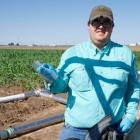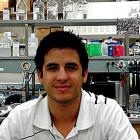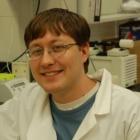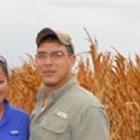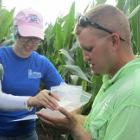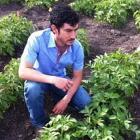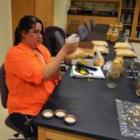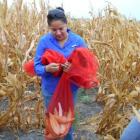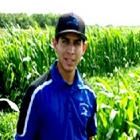Charles P. Woloshuk is a professor in the Department of Botany and Plant Pathology at Purdue University. Since his arrival at Purdue in 1993, he has mentored 7 post-doctoral associates and 11 graduate students (5 PhD and 6 MS). Dr. Woloshuk’s research interests include corn/mycotoxin pathology, especially in the areas of genetics, biochemistry, and physiology of mycotoxin biosynthesis. His long-range research goal is to contribute to the development of novel approaches for eliminating the risk of mycotoxin contamination of food sources. He investigates the biosynthesis of mycotoxins (aflatoxin and fumonisin) and uses mycotoxin-producing fungi as model systems to advance the current understanding of secondary metabolism in fungi. Dr. Woloshuk also is involved in research and extension activities that inform and educate grain producers, handlers, and processors about best management practices for grain storage. Dr. Woloshuk received his PhD from Washington State University, MS from the University of Maryland, and BS from Valdosta State College.
Project Personnel
Principal Investigators

Professor
Botany and Plant Pathology, Purdue University
915 W. State Street
West Lafayette, Indiana 47907-2054
Phone: (765) 494-3450
FAX: (765) 494-0363
E-mail: woloshuk@purdue.edu

Associate Professor and Extension Specialist
Department of Botany and Plant Pathology
Purdue University
Kiersten Wise is an Associate Professor and Extension Specialist for Agronomic Field Crop Diseases at Purdue University, with primary responsibility for diseases of corn, soybean, and wheat. Her research and extension programs focus on developing economical and sustainable disease management practices for agronomic field crops, including corn, soybean and wheat. Research efforts examine the effects of management techniques on the biology of plant diseases, and aim to identify disease management practices that will improve crop production efficiency and simultaneously increase our awareness of how diseases interact with their hosts.

Professor
Department of Botany and Plant Pathology
Purdue University
Botany and Plant Pathology, Purdue University
915 W. State Street
West Lafayette, Indiana 47907-2054
Phone: (765) 494-4448
FAX: (765) 494-0363
E-mail: gjohal@purdue.edu
Web: https://ag.purdue.edu/btny/pages/profile.aspx?strAlias=gjohal
Gurmukh (Guri) S. Johal is a professor of maize genetics and Pathology in the department of Botany and Plant Pathology. He has worked in both academic and industrial settings. Prior to coming to Purdue in 2002, Dr. Johal was a senior scientist at Pioneer Hi-Bred International Inc. from 1999 to June 2001, and prior to that an assistant professor in the department of Agronomy at University of Missouri-Columbia from 1993 to 1998. Dr. Johal is interested in interdisciplinary research that not only addresses fundamental problems concerning how plants contend with stresses – both biotic and abiotic - but also how to translate the knowledge gained into field applications. He has a broad base of training with expertise in genetics, genomics, breeding, pathology, biochemistry and physiology. Dr. Johal received his PhD from Simon Fraser University, BC, Canada, and MS from Punjab Agricultural University, Ludhiana, India.

Professor and Extension Plant Pathologist
Department of Plant Pathology and Microbiology
Texas A&M University
Tom Isakeit is a professor and extension plant pathologist, whose goal is to use his knowledge and experience in plant pathology to maximize the profitability and sustainability of Texas farmers. His specialization is management of diseases of cotton, corn and sorghum. His main focus in corn has been the management of aflatoxin, using multiple approaches. This involves collaborative field and laboratory research with other scientists, as well as applied research conducted on commercial farms in collaboration with other extension personnel. As part of his extension responsibility, current research results are presented to growers and other agribusiness personnel at meetings and field days throughout the state, and in the form of publications. His M.Sc. and Ph.D. in plant pathology were obtained at Michigan State University and his B.Sc. in agriculture is from the University of Alberta.

Associate Professor
Department of Plant Pathology and Microbiology
Texas A&M University
Won-Bo Shim’s research program at Texas A&M focuses on understanding the genetic, biochemical and molecular bases of fungal pathogenesis and mycotoxin biosynthesis in Fusarium species. Currently, his lab is investigating how F. verticillioides, the key pathogen responsible for causing ear and stalk rot of corn and for mycotoxins (fumonisins) on infested kernels. Dr. Shim’s long-term research goal is to identify and characterize genes that are involved in fumonisin biosynthetic regulation, fungal differentiation, and plant pathogenesis. The Shim lab at Texas A&M is utilizing modern genetic and genomic tools as well as computational approaches to characterize critical genes and signaling pathways in F. verticillioides.

Electrical and Computer Engineering, Texas A&M University
Byung-Jun Yoon received his B.S.E. (summa cum laude) degree from Seoul National University (SNU), Seoul, Korea, in 1998, and the M.S. and Ph.D. degrees from California Institute of Technology (Caltech), Pasadena, CA, in 2002 and 2007, respectively, all in electrical engineering. He was a postdoctoral researcher at Caltech from Dec. 2006 to Oct. 2007. In 2008, he joined the Department of Electrical and Computer Engineering at Texas A&M University, College Station, TX, where he is currently an assistant professor. His recent honors include the Faculty Early Career Development (CAREER) Award from the National Science Foundation (NSF) and the Best Paper Award at the 9th Asia Pacific Bioinformatics Conference (APBC), both in 2011. His main research interest is in signal processing, machine learning, bioinformatics, and computational biology.

Associate Professor
Agriculture, Agribusiness & Environmental Sciences
Texas A&M University Kingsville
Greta Schuster is originally from Weslaco, Tx but was raised in Starkville, Mississippi. Dr. Schuster has been at A&M-Kingsville since 2008. In addition to her teaching duties, she has a 25 percent appointment with AgriLife Extension. Previously, she worked in the Integrated Pest Management program in the Division of Agriculture at West Texas A&M University, the last three years as director of the program. She also held appointments with Texas Cooperative Extension and Texas A&M University. She was an extension integrated pest management agent for Castro and Lamb Counties. She earned her bachelor’s degree in animal science and her master’s degree in agronomy from East Texas State University and her doctorate in plant virology and plant pathology from Texas A&M University. Schuster has had numerous published manuscripts and publications and presented at a variety of professional meetings.
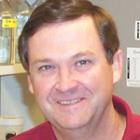
William Neal Reynolds Distinguished Professor
Department of Plant Pathology
North Carolina State University
Department of Plant Pathology
NC State University
Campus Box 7567
Raleigh, NC 27695-7567919-515-6994
Email: gary_payne@ncsu.edu
Gary Payne's research is on maize diseases, with a focus on ear rots and mycotoxin contamination. His research on fumonisins, produced by Fusarium verticillioides and aflatoxins, produced by Aspergillus flavus ranges from field studies on the ecology and epidemiology of the pathogens to genomic approaches aimed at understanding pathogenesis and the biosynthesis and regulation of these two toxins. His current research is focused on identification of maize resistance genes through transcriptional profiling of the interaction between these two fungi and maize seeds. Gary also works closely with colleagues who perform research on breeding for resistance to fumonisin contamination and on biological control for aflatoxin contamination.

Professor
Crop Science and Cropping Systems Specialist
North Carolina State Unversity
North Carolina State University
Vernon G. James Research Center
Plymouth, NC 27962
Phone (919) 793-4428
Fax (919) 793-5142
E-mail: Ron_Heiniger@ncsu.edu
Dr. Ronnie Heiniger is a professor in the Crop Science Department at North Carolina State University. He received his PhD in crop ecology from Kansas State University in 1994. Dr. Heiniger has worked for the past 19 years as a research and extension specialist at the Vernon G. James Research and Extension Center in Plymouth, NC. His responsibilities include research into precision agriculture and corn-wheat-soybean cropping systems. Dr. Heiniger is known for his applied research using on-farm comparisons. He has published articles and presented papers covering his work in precision agriculture and the use of aerial photography to determine nitrogen requirements for corn and wheat. Recent research has focused on increasing light use in corn through the use of higher plant populations and fungicides and measuring root growth in response to pre-plant fertilization. Dr. Heiniger has received the Gerold O Mott Award for outstanding research from the American Society of Agronomy and is a member of the Academy of Outstanding Extension Specialists at North Carolina State University.
More information can be found at Dr. Heiniger's Vernon James Center Homepage.

Associate Professor
Ignazio Carbone is a population biologist interested in phylogeography, molecular systematics, ecology and evolution. His primary research focus is on applying population genetic methods to retrace the natural history of fungal populations and species, to identify the origin of invading pathogens and to elucidate the underlying population processes that impact fungal genome architecture, particularly as it relates to gene clustering, function and adaptation. Dr. Carbone is actively developing software tools to facilitate evolutionary and population genetic analyses. He completed his B.S (1992), M.S (1994) and Ph.D (2000) at the University of Toronto. Dr. Carbone joined the Department of Plant Pathology at NC State University in 2002. For more information please visit his lab website.

Assistant Professor
Department of Plant Pathology
University of Arkansas
Department of Plant Pathology
Plant Sciences Building Room 217
University of Arkansas
Fayetteville, AR 72701
Phone: (479) 575-2677
Fax: (479) 575-7601
Email: bbluhm@uark.edu
Burt Bluhm is an Assistant Professor in the Department of Plant Pathology at the University of Arkansas. His research program is broadly focused on elucidating molecular-level interactions between plants and fungi during pathogenesis. An area of particular interest is the genetic and environmental regulation of mycotoxin biosynthesis by fungi during host colonization. Dr. Bluhm works with a diverse, interdisciplinary team of scientists to integrate new technologies and approaches into mycotoxin research. Additionally, he works closely with Extension personnel as well as state and national commodity boards to address plant disease issues of immediate concern to growers. Dr. Bluhm received his Ph.D. and M.S. degrees from Purdue University, and his B.S. degrees from the University of Oklahoma.

Professor
Food Science and Human Nutrition and Agricultural, Food, and Resource Economics
Michigan State University
Felicia Wu is the John A. Hannah Distinguished Professor of Food Science and Human Nutrition and Agricultural, Food, and Resource Economics at Michigan State University. Her research concerns the global health and economic risks of foodborne toxins, and the cost-effectiveness and feasibility of interventions to improve food safety in resource-poor settings. For her research on the impact of aflatoxin regulations on global liver cancer, Dr. Wu was awarded a National Institutes of Health EUREKA Award. She has been commissioned by the World Health Organization (WHO) to estimate the global burden of disease caused by foodborne aflatoxin and foodborne arsenic. Dr. Wu serves on the expert roster of the Joint FAO/WHO Expert Committee on Food Additives (JECFA) of the United Nations, and is one of three recipients of the 2011 Scientific Committee on Problems of the Environment (SCOPE)-Zhongyu award for global environmental research. She is an area editor for three journals: Risk Analysis, World Mycotoxin Journal, and Archives of Environmental and Occupational Health. Dr. Wu earned her PhD in Engineering & Public Policy from Carnegie Mellon University, and her AB and SM in Applied Mathematics from Harvard University.

Research Microbiologist (Ret.)
National Peanut Research Laboratory (USDA, ARS)
Bruce Horn was a Research Microbiologist at the National Peanut Research Laboratory (USDA, ARS) in Dawson, Georgia for nearly 25 years. His research interests included the ecology, population biology and taxonomy of fungi that produce mycotoxins in crops. He conducted research on the biological control of aflatoxins in peanuts and corn using nontoxigenic fungi, as well as research on sexual reproduction in aflatoxin-producing Aspergillus flavus and related species. Dr. Horn received his PhD and MA from the University of Kansas and BS from the University of Washington. Although retired from the NPRL, Dr. Horn remains involved in this project.
Students & Interns
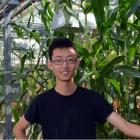
Ph.D student
Department of Botany and Plant Pathology
Purdue University
Weiran Li is a Ph.D. graduate student in the Department of Botany and Plant Pathology at Purdue University. He obtained a bachelor's degree in plant protection (2012) from China Agriculture University. Weiran’s research is focused on the project Objective 3.1 Establish biomarkers in corn that predict predisposition to mycotoxin contamination. He has greenhouse experiments that will allow him to measure the phenotypic, biochemical and molecular effects on corn exposed to drought and heat when applied four weeks prior to silking. His goal is to correlate data on photosynthesis parameters, CO2 fixation, transpiration, leaf temperature,soluble sugar and free amino acids levels, and gene expression with ear rot severity and aflatoxin and fumonisin levels at ear maturity. Weiran’s academic advisor is Dr. Charles Woloshuk.
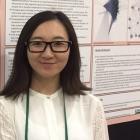
Ph.D. student
Department of Botany and Plant Pathology
Purdue University
Chenxing (Esther) Niu is a Ph.D. student with Dr. Charles Woloshuk at Purdue University studying the molecular regulation of fumonisin biosynthesis. Specifically, Esther’s research is focused on the transporter-like gene FST1. Deletion of this gene in F. verticillioides has been shown to cause defects in secondary metabolism (fumonisin production), cell wall structure, conidiogenesis, virulence, and resistance to reactive oxygen species. Her objectives are to: compare the transcriptomes of the wild type and FST1 mutant strain (Δfst1) during colonization of corn kernels; determine the importance of amino acids in the central loop and c-terminus regions of FST1; and characterize FST1 function when expressed in yeast (Saccharomyces cerevisiae) system. Results from this research will provide new basic knowledge about the function of a gene critical for fumonisin production.
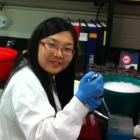
Ph.D. Student
Department of Plant Pathology and Microbiology Texas A&M University
Huan Zhang received B.Sc. (2009) and M.Sc. (2011) degrees in Plant Protection from Shandong Agricultural University, China; she is currently a Ph.D. student in the Department of Plant Pathology & Microbiology at Texas A&M University. Her research interests include functional genomics of fungal development and pathogenesis. Ms. Zhang was primarily responsible for biological sample preparations for RNA-Seq anayses in Theme 3 of the project (gene network anayses). She is a member of the American Phytopathological Society.

Ph.D. Student
Plant Pathology and Crop Science
North Carolina State University
Megan Sexton is a Ph.D. student co-majoring in Plant Pathology and Crop Science at North Carolina State University. Megan's research interests include mycotoxin pathology and fungal interactions at the molecular level. The goal of Megan's research is to develop new biocontrol mechanisms for mycotoxins (aflatoxin and fumonisin) in corn. Megan is also involved in extension projects to help inform farmers of better growing practices.

Ph.D. Student
Department of Agricultural, Food, and Resource Economics, Michigan State University
Jina Yu is a Ph.D. student in the Department of Agricultural, Food, and Resource Economics (AFRE) at Michigan State University. She recieved a Masters Degree in Economics from Korea University and BS in Economics from Hankook University of Foreign Studies in Korea. Her research focuses on analyzing the economic impact of pathogenic agents, such as malaria, and aflatoxin in developing countries. She is currently working on the Economic and riska analses in Task 4 of this project.
Tyler Mays is a Master's Degree student Texas A&M University-Kingsville, studying Plant and Soil Science, with emphases in agronomy and Integrated Pest Management. Upon completion, he intends to pursue a Ph.D. in Crop Production/IPM. Tyler is originally from Sweeny, Texas.
Alberto de la Garza is originally from El Higo, Veracruz, Mexico. He is currently studying Plant and Soil Science, with an emphasis on agronomy, at Texas A&M University-Kingsville, and is considering pursuing a Master's Degree. This summer, Alvaro will be interning at TAMUK.
Alvaro Garcia is originally from Brownsville, Texas. He is currently studying Plant and Soil Science, with an emphasis on agronomy and integrated pest management, at Texas A&M University-Kingsville. He is considering a M.S. in Plant & Soil Science. After previously interning at the USDA Plant Stress Laboratory in Lubbock, Alvaro will be interning this summer at Purdue University and working with Dr. Kiersten Wise.
Jacobo Solis is originally from Mission, Texas, and is majoring in Plant and Soil Science, with an emphasis on Agronomy, at Texas A&M University-Kingsville. He is currently spending the summer of 2015 interning at Purdue University, under the guidance of Dr. Kiersten Wise. Jacobo is considering pursuing an M.S. degree after graduation .
Postdoctoral Researchers

Postdoctoral Researcher
Department of Food Science & Human Nutrition, Michigan State University
Nicole J. Mitchell received her Ph.D. from Texas A&M University in 2013 with a concentration in integrative toxicology. Dr. Mitchell’s research during her graduate studies focused on aflatoxin and fumonisin remediation strategies that would be sustainable and culturally acceptable in highly exposed populations in Ghana. In particular, she conducted multiple intervention studies with a clay binder that is effective in absorbing aflatoxin and fumonisin within the gastrointestinal tract, thus reducing their bioavailability. Dr. Mitchell worked both on the coordination and study design teams for all of the interventions, and analyzed human biological samples for biomarkers of mycotoxin exposure. By utilizing a short-term biomarker of aflatoxin exposure in urine, her work showed significant reductions in bioavailability following substantially shorter intervention periods than previously demonstrated. The study design and use of a non-invasive biomarker established a novel approach for testing efficacy of new intervention strategies that would be both more cost-effective and safe for vulnerable populations.
Dr. Mitchell is currently working under Dr. Felicia Wu as a postdoctoral research associate at Michigan State University. Her current research interests include economic impacts of mycotoxin contamination in U.S. crops and foodstuffs, possible growth-faltering effects in children chronically exposed to combinations of mycotoxins in developing countries, and reduction of toxin exposures through an increase in dietary diversity.

Postdoctoral Researcher
Department of Electrical and Computer Engineering Texas A&M University
Mansuck Kim is a Postdoctoral Researcher in the Department of Electrical and Computer Engineering at Texas A&M University, College Station, TX, having completed his Ph.D. in that department in Spring 2016. Prior to joining Dr. Shim's team, he received a B.Sc. degree in mechanical engineering and the M.Sc. degree in integrated biotechnology from Sogang University, South Korea in 2006 and 2008, respectively. His research interests include computational biology and bioinformatics, and his role in this project lies in the gene network and module analyses of the transcriptomic data in Theme 3. The goal of his work is to identify genes that show statistically significant correlations with both stress conditions and mycotoxin levels.
Project Alumni
Rakhi Singh obtained her Masters in Microbiology and MBA in Biotechnology Management from India. She completed the Graduate Certification Program in Molecular Biotechnology at NCSU in 2007. Subsequently she joined Dr. Carbone’s lab as a Research Technician and Lab Manager in 2008. She was actively involved in the development of the Endobiodiversity.org website, storage and retrieval of project-generated data such as DNA sequences, metagenomic and transcriptome data.
Rakhi made significant technical contributions to this project. In a pilot study for this project she acquired molecular and sequencing data of diversity of A. flavus on corn ear populations from three states (Indiana, North Carolina and Arkansas) to establish the distribution of Aspergillus flavus among different ear sectors to determine if there was any sector or treatment effect on genetic diversity of A. flavus population on corn ears and to inform best sampling strategies. She archived hundreds of filamentious fungal cultures, performing DNA isolations, genotyping, DNA sequencing and data analysis followed by organization and compilation of molecular data. After performing and confirming in silico double digestions on a panel of reference genomes, she helped to develop effective and efficient high-throughput DNA isolation methods followed by double digest Restriction site Associated DNA Sequencing (ddRADSeq) for de novo SNP discovery and genotyping in A. flavus and F. verticillioides.
James "Trent" Monacell started graduate school at North Carolina State University in 2008, after receiving his B.S in Computer Science from Rose-Hulman Institute of Technology. He worked in the Carbone lab studying the genomics of filamentous fungi, in particular heterokaryosis and heterokaryon compatibility in Aspergillus section Flavi. He completed a Ph.D. in Bioinformatics in 2014, including a thesis entitled "Identification of heterokaryon incompatibility genes in Aspergillus using array comparative genome hybridization and whole genome sequencing".
Xiaomei Shu completed her Ph.D. in Plant Pathology at NCSU in 2014, under the direction of Dr. Gary Payne. She conducted various studies into maize infection with Aspergillus flavusand Fusarium verticillioides. Included among these were histology, RNA-sequencing, RNA in situ hybridization, and fungal mutagenesis approaches, which allowed her to identify novel maize genes and metabolic pathways associated with defense response to A. flavus and F. verticillioides, as well as novel pathogenesis genes from the fungi themselves. Dr. Shu is now an Associate Scientist with BASF.
Megan H. Meyers pursued a Master's in Plant Pathology at North Carolina State University under the supervision of Drs. Carbone and Heiniger. Megan earned her B.S. at The University of Wisconsin - Madison in Plant Pathology in 2013. Her research interests include biological control development, outreach/extension programs, and sustainable agriculture. She was heavily involved in the extension program at NCSU with Dr. Ron Heiniger. Megan's overall career goal is to educate growers on the risks of phytotoxins/mycotoxins and the precautions they can take to reduce their risk. Megan is also interested in the biological control industry and developing programs that encourage children to be involved with agriculture and learn about plant diseases.
Farhana Runa completed her Ph.D. in Plant Pathology at NCSU in 2014, working with Drs. Payne and Carbone. She is originally from Bangladesh, and obtained her BS in Microbiology from the University of Dhaka. After obtaining a M.Sc in Plant Pathology in 2009 from the University of Arizona working with Dr. Barry Pryor, her NCSU work focused on examining the nuclear condition of Aspergillus flavus. The conidia of A. flavus are multinucleate, but it is not clear whether they are homokaryotic or heterokaryotic. Moreover, the ontogeny and function of multiple nuclei in conidia and their role in the ecology of the fungus are also unknown. The overall goal of Farhana's research was to understand the process of multinucleate conidiation in A. flavus and the impact of nuclear condition on pathogenicity and secondary metabolite biosynthesis.
Rodrigo Olarte's contributions to this project came as a doctoral student in the department of Plant Pathology at NCSU. Rodrigo was born in the Philippines, but grew up near the San Francisco Bay Area. He received a B.A. in Molecular and Cell Biology with an emphasis in Cell and Developmental Biology at the University of California at Berkeley, and later completed a Masters in Plant Pathology at Cornell University in upstate New York. While at NCSU in hte lab of Dr. Ignazio Carbone, he studied the ramifications of sex in regard to toxin heritability in experimental crosses of the fungus Aspergillus flavus, with the long-term goal of finding more effective ways of controlling this fungus in nature. Rodrigo comleted his Ph.D. in 2014.
Carolyn Worthington completed her MS degree in Plant Pathology at North Carolina State University in July 2011, having previously obtained a BS in Biological Sciences from NCSU in 2008. As an undergraduate, she began working in Dr. Ignazio Carbone’s lab, studying mating type idiomorphs in Aspergillus section Flavi and mitochondrial inheritance in Petromyces parasiticus. Her thesis work examined interspecific crosses between Aspergillus flavus and A. parasiticus for mycotoxin diversity and genome heterogeneity. A significant component of her work was to test methodologies to detect fungal hybrids in nature, using the A. parasiticus x A. flavus interspecific cross as a model system. Carolyn tested various tools implemented in the SNAP Workbench Portal for multidimensional scaling of data, as well as exploring new approaches for detecting admixture and hybridization among closely related species. The data generated from Carolyn's thesis work provided a useful resource to further test new methods that quantify the magnitude of admixture and hybridization in nature.
Mary Lewis is a native of Fayetteville, NC and obtained her B.S. in Plant Biology from NCSU in 2012. As an undergraduate she worked in Dr. Ignazio Carbone's lab, receiving two Undergraduate Research Awards and participating in summer REU programs at the University of Nebraska and Cornell. In the summer of 2012, Mary was a Global Plant Health Intern at NCSU and had the opportunity to visit Costa Rica to study the population biology of black sigatoka on banana and plantain. She completed her M.Sc. under Drs. Carbone and Peter S. Ojiambo in 2014, focusing on biocontrol of Aspergillus flavus.
Victor Gutierrez is originally from Weslaco, Texas. He interned at TAMUK with Dr. Greta Schuster in the summer of 2014, and in May of 2015 received a degree in General Agriculture from TAMUK, with a minor in Plant Science. Victor now works for the Texas Water Resources Institute.
Amanda Lewis completed a summer internship in 2013 with Dr. Greta Schuster at TAMUK. She has since graduated from TAMUK, with a BS in Agriculture Science, minoring in Math, Plant Science, and Agribusiness. The recipient of a Rotary Disctrict 5930 Global Grant Schaolarship, Amanda is now studying Plant Science at the University of Wageningen in the Netherlands. She then intends to pursue a career in sustainable agriculture. Amanda is originally from Ciudad Valles, San Luis Potosi, Mexico.
Dale Herrington recently completed a bachelors degree in Plant and Soil Science with an emphasis in Agronomy at Texas A&M University-Kingsville. He is originally from College Station, Texas, where he has been involved with field research since he first worked with TAMU Soils and Crops Department in 2003. He transferred to TAMUK in 2012. In the summer of 2014, Dale worked with Dr. Ron Heiniger at the Vernon G. James Research and Extension Center in Plymouth, NC, and has since taken a position there as a Cropping Systems Research Specialist. In his spare time, Dale likes to fish and hunt with his dad.
Gregorio Carmona is originally from La Feria, Texas, and is currently a student at Texas A&M University-Kingsville pursuing a degree in Plant and Soil Science with an Environmental Soils option. His goal is to be part of the NRCS, where he hopes to work together with farmers to develop best management practices aimed at preserving soil fertility. He enjoys fishing, the beach, and riding horses. During the summer of 2014, Gregorio interned at Purdue University and worked with Dr. Kiersten Wise. He has since resumed studies at TAMUK, and works at the TAMUK Citrus Center.
Megan A. Dupnik participated in summer (2013) research at Purdue University under the supervision of Drs. Wise and Woloshuk while she was a junior in Plant and Soil Science at Texas A&M Kingsville. Her research helped determine the time required for aflatoxin M1 to clear the milk of goats that were fed aflatoxin-contaminated corn. Megan led the analysis of the milk, which involved purification of the aflatoxin M1 and its quantification by HPLC. Megan also participated in research to investigate the effects of low oxygen on Aspergillus flavus growth and aflatoxin production. This research was part of the on-going research on Purdue Improved Crop Storage (PICS) system. PICS consist of a low-cost bags system that creates a sealed barrier for store grain that results in a low-oxygen environment inside. Farmers in West and Central Africa are using PICS bags to control insect pests. Megan’s work was to determine if the PICS system could prevent the accumulation of aflatoxin during storage. Megan has since completed her undergraduate degree, and is now pursuing an M.S. at the University of Georgia, working on fungal diseases of biofuel crops.
Kameron Koepp is from New Braunfels, Texas. During his junior year at Texas A&M University-Kingsville, while majoring in Agriculture Science, he interned with Dr. Ron Heiniger at the Vernon G. James Research and Extension Center in Plymouth, NC. Active in 4-H and FFA through high school, Kameron continued with both organizations in college. His interests include hunting, fishing and restoring antique tractors, including his current project – restoring a John Deere tractor that belonged to his great-grandfather. The youngest of three children, he is the fourth generation to farm his family’s homestead, which he has returned to since completing his degree.
Deanna Cano interned at TAMUK with Dr. Greta Schuster in the summer of 2014. She has since completed a BS degree in General Agriculture, minoring in Plant Science. Deanna is originally from Weslaco, Texas, and is now pursuing a career in teaching.
Cesar Canales spent the summer of 2015 interning at Texas A&M University-Kingsville, where he was a student in the Agriculture Science Certification program. Cesar is now beginning a career as a teacher. He is originally from Raymondville, Texas.


